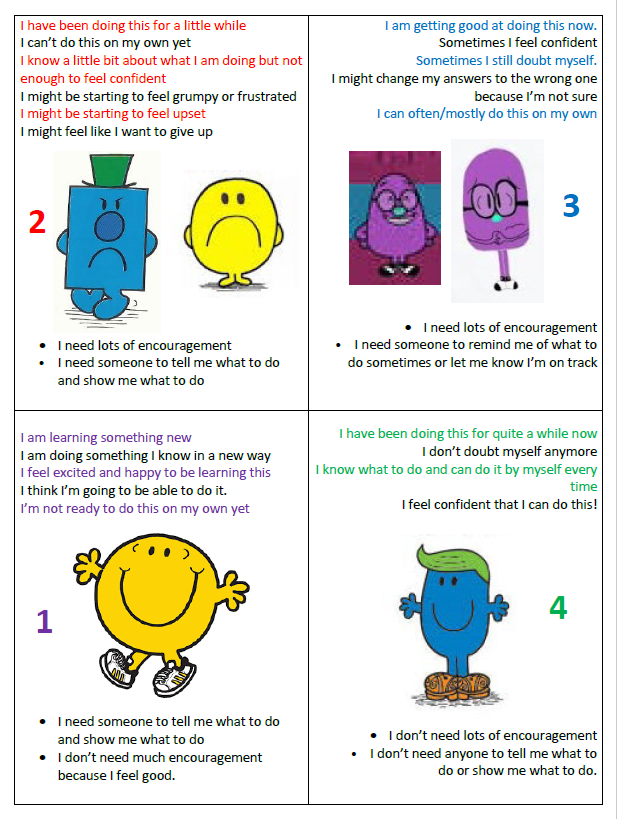Meeting Teachers Where They Are Up to

The end of the 2021 school year is upon us and many of us are turning our thoughts to what will happen in 2022. In my last post I talked about different aspects of getting ready for structured literacy instruction and shared a reflection template and action plan for individuals and teams to work through. This week I’d like to address what it looks like to support teachers through this journey at their various stages of development.
Just as there is no one size fits all for student learning, there is no one size fits all for teachers. Every one of us passes through various stages of development as we learn things. Whether it’s learning to drive a manual car, baking bread or learning to teach reading according to a structured approach, there are 4 predictable stages we will pass through.
Ken Blanchard’s Situational Leadership is a terrific model of this development. I use this with teachers and student alike. (I put the version below together with a group of students a few years ago).

- We begin learning to do something new. We know that we do not have the skill and knowledge to complete the task and feel ok about that. We feel enthusiastic, motivated and optimistic. We need a high degree of direction for begin our learning journey, but not much support because we already feel good.
- We have some knowledge and skill and have tried to perform the new task. We have either tried and not succeeded or the task has been so effortful that it was overwhelming. Our lack of success means that we become frustrated, disillusioned and discouraged. We also feel vulnerable and this means that we are likely to ‘put our walls up’. We know deep down that we don’t know what we are doing but don’t want to acknowledge that or worse, cannot see that we don’t know what we are doing. This stage is the most difficult to experience and manage. It’s where we think things like, “This is harder than I thought”, “I hate this” or “I don’t want to do this anymore”. We need a high degree of support and direction to continue our learning journey.
- IF we receive the appropriate amount of direction and support we move through to stage three. We have enough success to know that we are building proficiency, but not enough experience for the days when we doubt ourselves. This is where we second guess ourselves and may need frequent reassurance. We need a high degree of support, but not too much direction because we have a moderate to high level of competence in performing to task.
- Once we have a certain level of knowledge, skill and experience, we move to stage four where we are considered peak performers. We don’t need much direction or support and are often able to help others on their own learning journey.
For a teacher developing the knowledge and skills of teaching structured literacy, the journey might look like this:
1) Box number one - Enthusiastic Beginner.
What a teacher might be experiencing
"I hear there’s this thing called the science of reading. It sounds promising. Yay!"
How you can help them
Provide simple information.
Show them how to do what you need them to do. Give feedback and help them experience success.
2) Box number two - Disillusioned Learner
What a teacher might be experiencing
"I have started to read a bit. There is SO much to read. Now that I have started looking into the SoR I feel totally overwhelmed. I think I know a bit about it, but I have no idea how to implement it. Everyone else seems to know what to do. I feel like a terrible teacher. I wish everyone would stop talking about SoR and just let me get on with teaching."
How you can help them
Recognise that learning to the do things differently is difficult. Help the person know that you are on their side by acknowledging their challenges and encouraging engagement in the new undertakings. Continue to help them build understanding and coach them through learning new teaching routines in small steps. Demonstrate what to do, let them have a go and then give feedback. Take things slowly and aim for small improvements. Celebrate success. Make sure that the teacher has voice in the learning process and can share their thoughts but remember that they still need direction. Don’t expect them to make all the decisions about the new practices on their own. They don’t yet have the experience to do so.
3) Box Number three - Emerging Contributor
What they might be experiencing
"I have tried some things out that seem to work and I am feeling a little more confident, but now I second guess myself. I used to feel that I knew what I was doing. Now I’m not so sure. Feeling uncertain sometimes stops me taking further action to develop practice. I seek reassurance often."
How you can help them
Help the teacher celebrate successes. Remind them of their past successes. Let them make decisions about their teaching and check back in with them about how it’s gone. Make sure they have the chance to ‘run things by you’ for reassurance, but avoid over directing. At this stage the teacher does have the skill and knowledge they need, they just doubt themselves. Ask questions that prompt their problem solving.
4) Box Number four - Peak Performer
What they might be experiencing
I have enough knowledge and experience now to feel confident in what I am doing. I am happy to take risks, be innovative and support others
How you can help them
Let them get on with teaching. Peak performers are able to adjust and tweak their teaching to suit student need without compromising the core of the approach. Allow them to make decisions and propose changes or innovations. Peak performers can support those around them, but recognise that they also need to develop the skills to work with colleagues through all 4 stages of learning effectively.
Regardless of the stage of development your team members are sitting in, remember to:
- Respect cognitive load
- Respect their existing knowledge and skill. Even when new to structured literacy, a teacher isn’t starting from zero. They have things to bring to the table.
- Help the teacher pick ‘low hanging fruit’. Choose tasks to develop that the teachers already have some experience in so that they experience success. Success breed success.
- Spotlight and celebrate success as often as possible.
- Find out where teachers are up to. Then meet them there.
- Reach out for direction and support whenever you need it. You are a learner too.

 Jocelyn Seamer Education
Jocelyn Seamer Education
2 comments
Great stuff, as always! Thanks for this post 😀
Encouraging, inspiring and empowering. You continue to reassure us, you continue to support us and you are the kind of encouragement we need especially during these times. Thank you for being there for us. You Rock!!!
Leave a comment